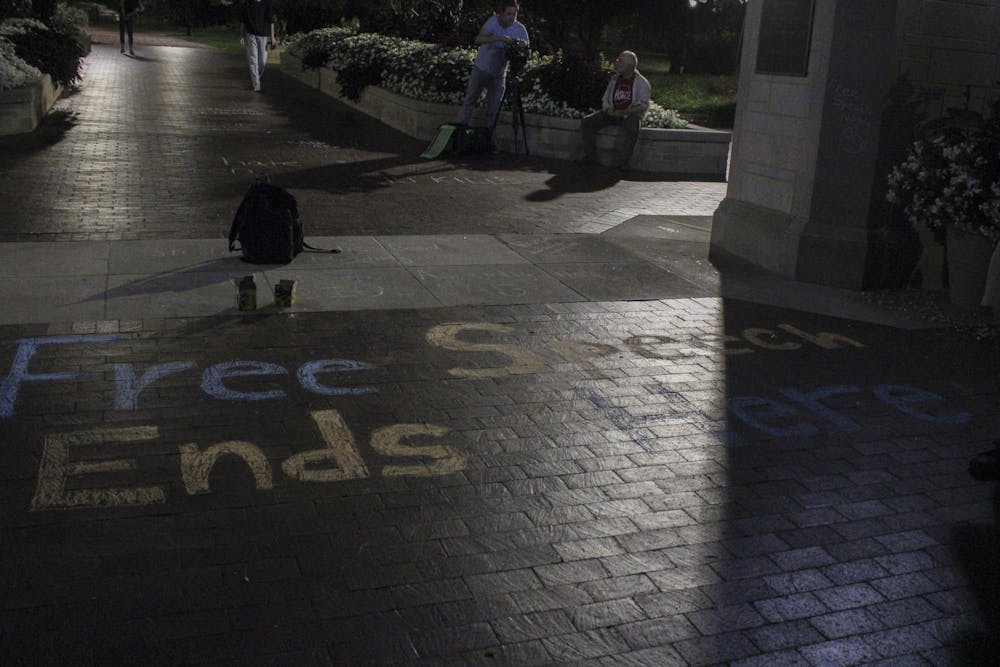Two, but not all, attendees of a Sunday candlelight vigil were referred by Indiana University Police to university officials, saying they might have violated policy.
The vigil intentionally violated IU’s new expressive activity policy’s ban on protesting and peaceful assembly outside the hours of 6 a.m. to 11 p.m. by beginning at 11:30 p.m. The event garnered at least 40 attendees.
Graduate student Bryce Greene and associate professor of Germanic studies Benjamin Robinson, both of whom attended and spoke at the vigil, were identified as “directing people and giving speeches” by three IU officials.
Those officials — Vice Provost for Student Life Lamar Hylton, Associate Vice President of Events and Conferences Doug Booher and Superintendent for Public Safety Benjamin Hunter — sent reports to IU Police leadership about Robinson and another individual, who Greene believes is himself.
Robinson received the reports from College of Arts and Sciences Dean Rick Van Kooten as part of the complaint process under IU’s Academic Appointee Responsibilities and Conduct policy.
These reports were then shared by Margo Bennett, IUPD deputy superintendent and special advisor, to Libby Spotts, director of student conduct, and Carrie Docherty, vice provost for faculty and academic affairs.
They also reported another individual the three university officials couldn’t identify.
“The female speaking to the assembled group has not been identified, as additional photos and media are released by groups, she will be identified, and this referral will be amended,” Bennett wrote.
Bennett also included a screenshot from the Green Feather Movement, a student, faculty and staff organization, promoting the vigil.
Greene received an email from Spotts on Tuesday informing him of the report and potential personal misconduct violation he faces.
According to the email, Greene can seek an “Alternative Resolution Process,” which would require him to “accept responsibility for the decisions” he made “and the harm that was caused” and “discuss what needs to occur to rebuild trust with the community and ensure community safety.” If he or Spotts chooses to instead follow the standard disciplinary proceedings to resolve the report, he could face disciplinary probation, suspension or expulsion.
Greene has served as the graduate advisor of the Palestine Solidarity Committee and was an organizer of the pro-Palestinian encampment in Dunn Meadow. He was arrested and banned from campus for five years on the third day of the encampment in April. His criminal charge was later dropped, and he posted on X, formerly known as Twitter, in June that he was allowed back on campus.
Robinson said over text message that Docherty contacted Van Kooten. He wrote the case now seems to be going through a formal investigation.
Under IU policy, the principal administrator, in this case Van Kooten, first seeks an “informal resolution.” If that isn’t reached, the administrator or the campus chief academic affairs officer proceeds with an investigation, which could result in a common or severe sanction. Common sanctions are “intended as proportional, corrective disciplinary responses to discrete policy violations.” A severe sanction would significantly alter the terms of the academic appointee’s, in this case Robinson’s, employment or assigned work.
Greene, Robinson and three additional vigil attendees told the IDS they weren’t aware of any other protesters who received a violation referral.
Mark Bode, IU executive director for media relations, said IU doesn’t comment on individual misconduct cases and referred to IU’s expressive activity policy.
Greene said it creates a “chilling effect” for others trying to organize against the university’s policies on campus.
“The fact is, it doesn’t look like they were actually going after me for any violation of policy,” Greene said. “If that were the case, then there would be other people other than me and Ben Robinson who would be under the microscope right now. But both myself and Ben have been very active on this campus fighting for various causes, and the university decided to single out us.”
RelatedProtesters defy IU policy at vigil, believe free speech is under attack A faculty group has set out a list of demands for the university.
Robinson agreed. He said based on the IU officials’ reports, he believes the university singled out certain organizers likely to violate the policy prior to the demonstration.
“Clearly, what they didn’t do, is apply the law equally,” Robinson said. “They clearly made assumptions about peoples’ roles and singled people out on the basis of some assessment of how much they were expressing themselves I guess, or some assessment of intention to express themselves. It’s not clear.”
John Walbridge, IU Middle Eastern languages and cultures professor, attended the vigil but did not receive a report. He wrote an email to Docherty arguing the demonstration should be allowed under Indiana law because it did not disrupt university operations.
“The right of the university to specify reasonable times and places for protest clearly does not extend to banning all ‘expressive behavior’ at night--an absurdly overbroad and ill-defined term,” Walbridge wrote. “Does it cover individual conversations? Visiting speakers who run late? Muslim students doing Qur'an recitation on the Night of Power? Students celebrating a football victory? Election night watch parties? It is not even clear whether the policy applies only to outdoor activities or also includes indoor activities.”
Isaac Perlich contributed to this story.
Editor’s note: Bryce Greene is a former opinion columnist for the IDS.




